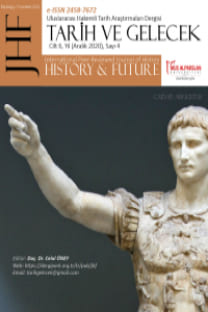Fransız Basınında Sakarya Zaferi
Öz Osmanlı Devleti’nin Mondros Ateşkes Antlaşması ile Birinci Dünya Savaşı’ndan çekilmesi sonrasında Türk milleti için yeni bir dönem başladı. İtilaf Devletleri, Ateşkes Antlaşmasının maddelerini yeniden şekillendirecekleri bir Osmanlı Devleti için hazırlamışlardı. Anlaşmanın imzalanmasından kısa bir süre sonra İngiltere, Fransa ve İtalya doğrudan işgallere başladı. İtilaf Devletlerinin saflarına sonradan katılan (1917) Yunanistan ise İngiltere’nin desteği ile İzmir’e asker çıkararak işgalini Batı Anadolu’dan Sakarya nehrine kadar genişletmiştir. Ülkenin batısından başlayarak genişleyen Yunan işgali Türk halkının tepkisini daha çok çekmiş, Milli Mücadelenin direncini arttırmıştır. Fransa, İngiltere ile daha önce yaptığı gizli anlaşmalar doğrultusunda Türkiye’nin kendine ayrılan bölümlerini işgal etmeye başladı. Dönemin Fransız basını, Türk topraklarında bulunan ordularının Ateşkes Antlaşması doğrultusunda ülkelerinin çıkarlarını, Hıristiyanlar ve Ermenilerin can güvenliğini koruduğunu yazmaktaydı. Başlangıçta Türkiye ile ilgili haberler İstanbul’da bulunan haber ajansları veya gazetelerin muhabirleri aracılığıyla veriliyordu. Ayrıca İşgaller karşısında Türk halkının tepkileri ya doğrudan kendi gözlemleri ya da Türk basınında çıkan haberlere dayanılarak aktarılıyordu. Atatürk’ün önderliğinde başlatılan Milli Mücadele ile ilgili haber ve yorumlar ise genellikle “Kemalistler” veya “Kemalist Ordular” başlığı altında verilirken, Yunan işgali ile ilgili haberler başlangıçta Atina muhabirlerinin izlenimleri doğrultusunda aktarılıyordu. Yunan işgaline karşı girişilen Milli Mücadele hareketi gazetelerin büyük bir çoğunluğu tarafından “Türk- Yunan Çatışması” başlığı altında anlatılıyordu Sakarya Zaferinden sonra Fransız basınında, Türk- Yunan savaşının sadece haberlerini değil, bu savaşın nedenlerini de sorgulamaya başladığını görüyoruz.
Anahtar Kelimeler:
Sakarya Savaşı, Milli Mücadele, Fransız Basını, Doğu Sorunu
Sakarya Vıctory in the French Press
ABSTRACT After the Ottoman Empire withdrew from the First World War with the Armistice of Mudros, a new era began for the Turkish nation. The Entente Powers had prepared the articles of the Armistice Agreement for an Ottoman State that they would reshape. Shortly after the signing of the treaty, England, France and Italy began direct invasions. Greece, which later joined the ranks of the Allied Powers (1917), expanded its lands from Western Anatolia to Sakarya River right after landing troops in Izmir with the support of England. The Greek occupation, which expanded from the west of the country, provoked a response of Turkish people more and increased the resistance of the national unity. France began to occupy the parts of Turkey reserved for them, based on the secret agreements it had previously made with England. The French press of the period was writing that their army on Turkish soil was protecting the interests of their country and the life of Christians and Armenians in line with the ceasefire agreement. In the beginning, news about Turkey was being given through the news agencies or the reporters of the newspapers in Istanbul. In addition, the reactions of Turkish people against the invasions were transferred either directly by their own observations or based on the news in the Turkish press. While the news and comments about the war of independence initiated under the leadership of Atatürk were usually written under the title of "kemalists" or "kemalist armies", the news about the Greek occupation was initially transferred from the impressions of correspondents from Athens. The war of independence against the Greek occupation was described by the majority of the newspapers under the title of "Turkish-Greek Conflict". After Sakarya victory, the French press not only gave news of the Turkish-Greek Conflict, but also began to question the reasons for this war. Disagreements among the Allies started to be discussed over Turkish Greek Conflict. While the leading members of the Allies, France, England and Italy’s mediatorship issue was discussed in the press, the attitudes of the governments towards both the invasion attempt of Greece and the developments started to become a subject of criticism among these press. Another issue is that each newspaper sent its own correspondents to Ankara where new nation was shaping, and to the fronts where the war was happening.
Keywords:
Keywords: Bettle of Sakarya, National Struggle, French Presse, Eastern Question,
___
- André, “Léttre de Constantinopole: L’Enthousiasme de la Victoire”, Le Radicale, 22 Septembre 1921.
- André, Pierre; “La Défaite de l’İmperialisme Greco-Anglais”, Le Populaire; 21 Septembre 1921, No: 166.
- Banville,Jacque, “L’Accord Franco-Turc et La Grece”; L’Action Française, No: 205, 22 Octobre 1921.
- Baykal, Hülya, “Kurtuluş Savaşı’nda Türk Fransız İlişkileri ve Bir Türk- Fransız Dostu Albay Mougin”, s. 470, Atatürk Araştırma Merkezi Dergisi, Ankara 1992.
- Berthoulat, Georges, “LaDéféction de la Turquie”, La Liberté 1 Novembre 1918, N: 2031.
- Bulut, Hüseyin, “Atatürk Devri Türk Fransız İlişkileri”, Türkiyat Araştırmaları Enstitüsü Dergisi, Sayı 62, s. Erzurum, Mayıs 2018
- Kaştan, Yüksel, “Alman Kaynaklarına Göre Milli Mücadelede Türk Ordusu İle Yunan Ordusu Arasında Gerçekleşen Sakarya Meydan Muharebesi Ve Önemi”, Uluslararası Sosyal Araştırmalar Dergisi, Cilt 12, Sayı 68, 2019.
- Lautier, Eugien, “Le Conflit Franco-Anglais Sur La Question d’Orient”, LHomme Libre; No: 1933, 8 Novembre 1921. Nicot,Lucien, “Quatre ans de Guerre Turquie”, Le Gaulois, Novembre 1918, No: 44993.
- Philios; “Lettre D’Athène, La Couronne d’épine”, Le Figaro, 16 Septembre 1921.
- Pinon, René, “La Retrait des Grecs”, L’Ouest-Eclaire, No:7507, 24 Septembre 1921.
- Saglio, Charles, “M. Gounaris Va Venir à Paris: La Grece Constantinienne Veut Reparer sa Défaite et Cojurer sa Faillite”, L’Oeuvre, No: 2208, Lundi 17 Octobre 1921.
- Schlicklin, Jean, “Le Problème De Proche Orient”, L’Europe Nouvelle”, No: Paris 27, Juillet 1922.
- Soysal, İsmail, Türk Fransız Siyasal İlişkileri (1921-1984), Belleten, Sayı: 47, Ankara 1983.
- Umar, Ömer Osman, Melek Yenisu, Gizli Antlaşmalar Çerçevesinde San Remo Konferansı’nda Ortadoğu’yu Şekillendirme Çabaları, Atatürk Araştırma Merkezi Dergisi, Cilt 36, Ankara 2020.
- Yavuz, Bilge, “1921 Tarihli Türk Fransız Antlaşması’nın Hazırlık Aşamaları”, Atatürk Araştırma Merkezi Dergisi, Volume: 8, İssue: 23, s.273- 308, Ankara 1992.
- Yayın Aralığı: Yılda 4 Sayı
- Başlangıç: 2015
- Yayıncı: Celal ÖNEY
